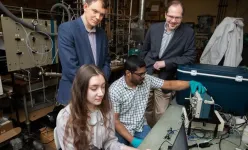(Press-News.org) University of Leeds news
Embargo: Thursday 28 March 2024, 23:30 UK time
Do sweeteners increase your appetite? New evidence from randomised controlled trial says no
Replacing sugar with artificial and natural sweeteners in foods does not make people hungrier – and also helps to reduce blood sugar levels, a significant new study has found.
The double blind randomised controlled trial found that consuming food containing sweeteners produced a similar reduction in appetite sensations and appetite-related hormone responses as sugary foods - and provides some benefits such as lowering blood sugar, which may be particularly important in people at risk of developing type 2 diabetes.
The use of sweeteners in place of sugar in foods can be controversial due to conflicting reports about their potential to increase appetite. Previous studies have been carried out but did not provide robust evidence.
However, the researchers say their study, which meets the gold standard level of proof in scientific investigation, provides very strong evidence that sweeteners and sweetness enhancers do not negatively impact appetite and are beneficial for reducing sugar intake.
The trial was led by the University of Leeds in collaboration with the The Rhône-Alpes Research Center for Human Nutrition. It is the latest study to be published by the SWEET consortium of 29 European research, consumer and industry partners which is working to develop and review evidence on long term benefits and potential risks involved in switching over to sweeteners and sweetness enhancers in the context of public health and safety, obesity, and sustainability. It was funded by Horizon Europe.
Lead author Catherine Gibbons, Associate Professor in the University of Leeds’ School of Psychology, said: “Reducing sugar consumption has become a key public health target in the fight to reduce the rising burden of obesity-related metabolic diseases such as type 2 diabetes.
“Simply restricting sugar from foods without substitution may negatively impact its taste or increase sweet cravings, resulting in difficulties sticking to a low-sugar diet. Replacing sugars with sweeteners and sweetness enhancers in food products is one of the most widely used dietary and food manufacturing strategies to reduce sugar intake and improve the nutritional profile of commercial foods and beverages.”
Principal investigator Graham Finlayson, Professor of Psychobiology in the University of Leeds’ School of Psychology, said: “The use of sweeteners and sweetness enhancers has received a lot of negative attention, including high profile publications linking their consumption with impaired glycaemic response, toxicological damage to DNA and increased risk of heart attack and stroke. These reports contribute to the current befuddlement concerning the safety of sweeteners and sweetness enhancers among the general public and especially people at risk of metabolic diseases.
“Our study provides crucial evidence supporting the day-to-day use of sweeteners and sweetness enhancers for body weight and blood sugar control.”
The study, which is the first of its kind, looked at the effects of consuming biscuits containing either sugar or two types of food sweetener: natural sugar substitute Stevia, or artificial sweetener Neotame on 53 adult men and women with overweight or obesity.
Until now, virtually all studies of the effects of sweeteners and sweetness enhancers on appetite and glycaemia have been conducted using beverages as the vehicle. Few studies include volunteers with overweight or obesity and few have included volunteers of both sexes.
Most studies have only compared a single sweetener, mostly aspartame, with a control, and very few studies have examined the effect of repeated daily intake of a known sweetener or sweetness enhancer in the normal diet.
The new trial took place at the University of Leeds and the Rhône-Alpes Research Center for Human Nutrition (CRNH-RA), France between 2021 and 2022. Participants were all aged 18 to 60, with overweight or obesity.
The trial consisted of three two-week consumption periods, where participants consumed biscuits with either fruit filling containing sugar; natural sugar substitute Stevia, or artificial sweetener Neotame, each separated by a break of 14-21 days. Day 1 and day 14 of the consumption periods took place in the lab.
Participants were instructed to arrive in the lab after an overnight fast, a blood sample was taken to establish baseline levels of glucose, insulin and appetite-related hormones. They were also asked to rate their appetite and food preferences.
After consuming the biscuits, they were asked to rate how full they felt over several hours. Glucose and insulin levels were measured, as were ghrelin, glucagon-like peptide 1 and pancreatic polypeptide – hormones associated with the consumption of food.
The results from the two sweetener types showed no differences in appetite or endocrine responses compared to sugar, but insulin levels measured over two hours after eating were reduced, as were blood sugar levels.
SWEET project joint co-ordinator Professor Anne Raben, from the University of Copenhagen, Denmark, said: “The findings show that sweeteners are a helpful tool to reduce intake of added sugar without leading to a compensatory increase in appetite or energy intake, thereby supporting the usefulness of sweeteners for appetite, energy and weight management.”
Further information
“Acute and two-week effects of Neotame, Stevia Rebaudioside M and sucrosesweetened biscuits on postprandial appetite and endocrine response in adults with overweight/obesity – a randomised crossover trial from the SWEET Consortium” is published in The Lancet eBioMedicine on 28 March 2024.
Email University of Leeds press officer Lauren Ballinger on l.ballinger@leeds.ac.uk with media enquiries.
University of Leeds
The University of Leeds is one of the largest higher education institutions in the UK, with more than 38,000 students from more than 150 different countries. We are renowned globally for the quality of our teaching and research.
We are a values-driven university, and we harness our expertise in research and education to help shape a better future for humanity, working through collaboration to tackle inequalities, achieve societal impact and drive change.
The University is a member of the Russell Group of research-intensive universities, and plays a significant role in the Turing, Rosalind Franklin and Royce Institutes. www.leeds.ac.uk
Follow University of Leeds or tag us in to coverage: Twitter | Facebook | LinkedIn | Instagram
END
Do sweeteners increase your appetite? New evidence from randomised controlled trial says no
2024-03-29
ELSE PRESS RELEASES FROM THIS DATE:
Women with obesity do not need to gain weight during pregnancy, new study suggests
2024-03-29
The guidelines for weight gain during pregnancy in obese women have long been questioned. New research from Karolinska Institutet supports the idea of lowering or removing the current recommendation of a weight gain of at least 5 kg. The results are published in The Lancet.
International guidelines from the US Institute of Medicine (IOM) state that women with obesity should gain a total of 5 to 9 kg during pregnancy, compared to 11.5 to 16 kg for normal-weight women. The guidelines have long been questioned, but there has been no evidence to warrant a re-examination.
A new study from Karolinska Institutet in Sweden now shows that there are no increased health risks for either the mother or ...
Individuals with multiple sclerosis face substantially greater risk of hospitalisation and death from COVID-19, despite high rates of vaccination
2024-03-28
Authors say the findings underscore the urgent need for preventive measures for people with MS who are inadequately protected by COVID-19 vaccination alone.
*Please mention the European Congress of Clinical Microbiology and Infectious Diseases (ECCMID 2024, Barcelona, 27-30 April) if using this material*
New real-world research being presented at this year’s European Congress of Clinical Microbiology and Infectious Diseases (ECCMID 2024) in Barcelona, Spain (27-30 April) reveals that people living with multiple sclerosis (MS) face a much higher ...
Study shows obesity in childhood associated with a more than doubling of risk of developing multiple sclerosis in early adulthood
2024-03-28
New research to be presented at this year’s European Congress on Obesity in Venice, Italy (12-15 May) shows that having obesity in childhood is associated with a more than doubling of the risk of later developing multiple sclerosis. The study is by Professor Claude Marcus and Associate Professor Emilia Hagman, Karolinska Institutet, Stockholm, Sweden, and colleagues.
Emerging evidence implies a link between high BMI in adolescence and an increased risk of Multiple Sclerosis (MS). Yet, most studies evaluating this association are cross-sectional, have retrospective design with self-reported data, have used solely genetic correlations, or use paediatric ...
Rice Emerging Scholars Program receives $2.5M NSF grant to boost STEM education
2024-03-28
Rice University’s Emerging Scholars Program (RESP) has received a five-year, $2.5 million grant from the National Science Foundation. The funding aims to bolster achievements in science, technology, engineering and mathematics (STEM) among students from under-resourced families and communities.
The grant will enable RESP to expand its reach and impact, offering increased support to its scholars via summer tuition scholarships, housing subsidies and research stipends. The number of scholars in the program will increase from 40 to 50 in Summer 2024 and to 60 in Summer 2025.
“Rice ...
Virtual rehabilitation provides benefits for stroke recovery
2024-03-28
A stroke often impacts a person’s ability to move their lower body from the hips down to the feet.
This leads to diminished quality of life and mental health in addition to increased susceptibility to falls. But now, UBC Okanagan researchers are exploring new treatment methods to help bridge the service delivery gap, and recovery outcomes, for patients after a stroke.
“Shortened length of inpatient stays and continued challenges in transitioning back to the community—including poor access to continued stroke rehabilitation services—have resulted in substantial unmet recovery needs,” ...
Generative AI develops potential new drugs for antibiotic-resistant bacteria
2024-03-28
With nearly 5 million deaths linked to antibiotic resistance globally every year, new ways to combat resistant bacterial strains are urgently needed.
Researchers at Stanford Medicine and McMaster University are tackling this problem with generative artificial intelligence. A new model, dubbed SyntheMol (for synthesizing molecules), created structures and chemical recipes for six novel drugs aimed at killing resistant strains of Acinetobacter baumannii, one of the leading pathogens responsible for antibacterial resistance-related deaths.
The researchers described their model and experimental validation of these new compounds in a study published March 22 in the journal ...
Biofuels could help island nations survive a global catastrophe, study suggests
2024-03-28
A major global catastrophe could disrupt trade in liquid fuels used to sustain industrial agriculture, impacting the food supply of island nations like New Zealand that depend on oil imports.
A new study in the journal Risk Analysis suggests that New Zealand and other island nations dependent on imported fuel can plan for future emergencies by stepping up their production of biofuel from locally grown crops (like canola) and farming more fuel-efficient crops (like wheat and potatoes rather than dairy).
In the event of a major disruption in liquid fuel imports, results showed that New ...
NJIT research team discovering how fluids behave in nanopores with NSF grant
2024-03-28
A research team from New Jersey Institute of Technology is uncovering mysteries surrounding fluids in nanoporous materials, and has been recently awarded a grant from the National Science Foundation (NSF) to support this research.
The research is focused on the elasticity, or compressibility, of fluids in these nanopores. Understanding the elastic properties of fluids has significant implications across multiple disciplines. Engineering applications, geological exploration, materials science and environmental studies ...
New study shows association of historical housing discrimination and shortfalls in colon cancer treatment
2024-03-28
BIRMINGHAM, Ala. – A nationwide study of 196 cities shows that housing discrimination from 90 years ago still casts a historical shadow of inequities in colon cancer care today, S.M. Qasim Hussaini, M.D., of the University of Alabama at Birmingham and colleagues at the American Cancer Society and Johns Hopkins School of Public Health report in the journal JCO Oncology Practice.
In the 1930s, the federally sponsored Home Owners’ Loan Corporation, or HOLC, used racial composition to map out residential areas worthy of receiving mortgage loans and those areas to avoid. Neighborhoods ...
Social media use may help to empower plastic surgery patients
2024-03-28
Waltham — March 28, 2024 — For patients considering or undergoing plastic and reconstructive surgery (PRS) procedures, using social media to gather information and answer questions can enhance patient empowerment – potentially leading to increased autonomy and better decision-making, reports a study in the April issue of Plastic and Reconstructive Surgery®, the official medical journal of the American Society of Plastic Surgeons (ASPS). The journal is published in the Lippincott portfolio by Wolters Kluwer.
"Our study suggests that connecting to social media is associated with meaningful increases in empowerment for PRS patients, ...


